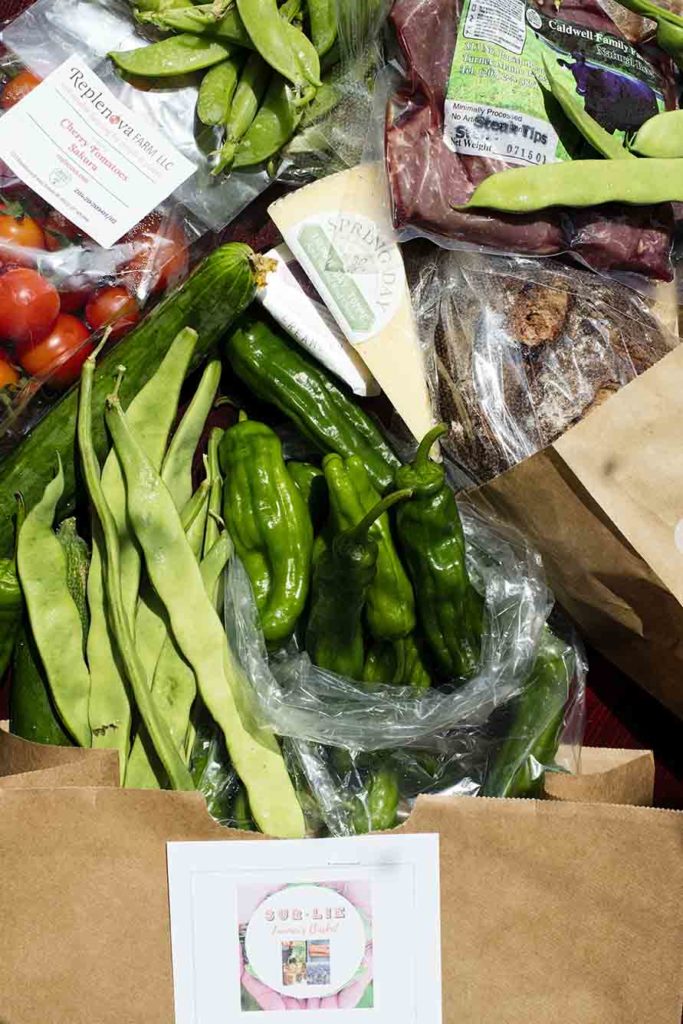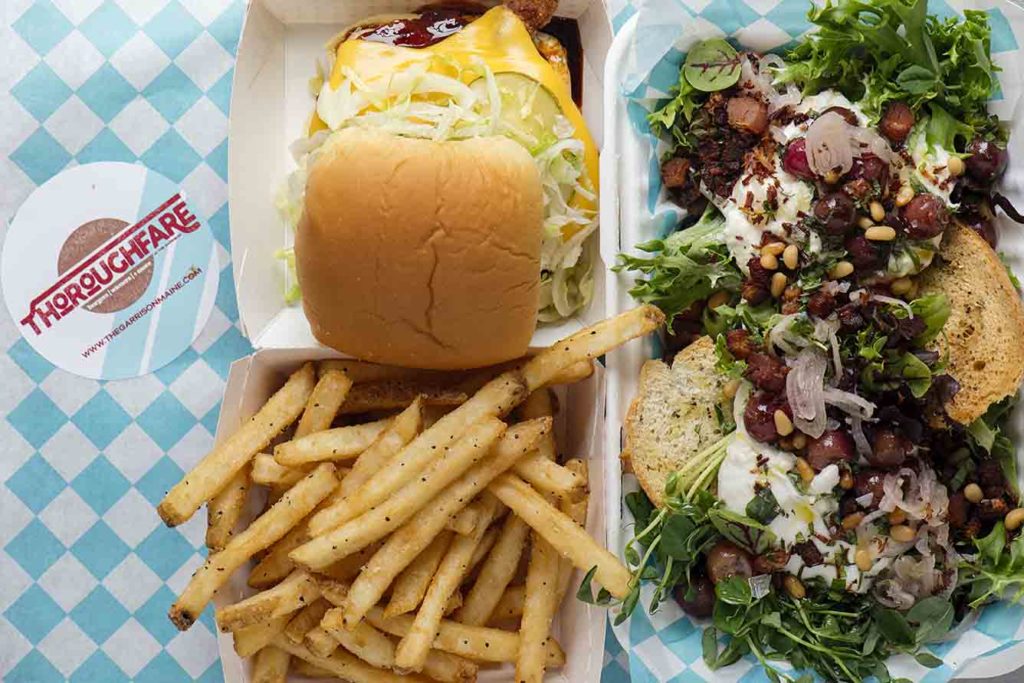Recipes for Survival
From market baskets and takeout drinks to rebranded comfort food, three southern Maine restaurants took different paths to navigate the pandemic

Recipes for Survival
From market baskets and takeout drinks to rebranded comfort food, three southern Maine restaurants took different paths to navigate the pandemic
by Susan Sherrill Axelrod
Photography by Nicole Wolf
Issue: October 2020
The second weekend in March 2020 is one Maine’s restaurant community will never forget. By the time the state confirmed its first case of the virus, any excitement over spring menu planning had been put aside, replaced by fervent discussions about operating safely and possible staff layoffs.
By the end of the weekend, chairs had been put up on tables in darkened dining rooms that would not come down again for months, or, in some cases, ever. Survival depended on adaptation. The principals of three popular Portland-area restaurants share how they did it.
SUR LIE

“It felt like a shock at first,” says Krista Cole, co-owner with Antonio Alviar of Sur Lie in Portland, which shut down on March 14. Three days later, they opened the restaurant for curbside pickup and delivery of their regular menu, but by early April had realized that they needed to do something more sustainable. Cole and Alviar turned to the local vendors the restaurant uses. They began offering what they call “farmer’s baskets” filled with meat, vegetables, or both, plus cheese from Spring Day Creamery or Flying Goat Farm and a loaf of bread from Portland’s Standard Baking Company. Cole posts each week’s offerings from Thursday to Sunday; on Monday morning she calls in orders to the farms. Tuesdays and Wednesdays are pickup and prep days, and customers get the baskets on Thursdays.
Sur Lie’s established fan base combined with concerns over in-person food shopping made the baskets an immediate hit. “It kicked off really strong and we were selling out,” Cole says. Over time, they added more options: marinated ready-to-grill meats, sides and salads, fish from SoPo Seafood, desserts from Ilma Lopez at Portland’s Chaval, and a rotating wine pairing.
“We have a great partnership with Chaval—Damian [Sansonetti, Lopez’s husband and partner] can get a whole pig in and sell us the meat, which is out-of-this-world,” says Cole. Chicken comes from Tide Mill Organic Farm or Common Wealth Poultry, and the beef from Caldwell Farms. She is proud of the financial support Sur Lie has been able to give local growers and producers, and there have been other benefits, too. “We have built some new partnerships with farms we hadn’t worked with before, and it’s been really cool because normally Tony and I don’t drive around and pick up from our farmers,” she says. “The chef has always had an intimate relationship with them, but now we do as well.”
BODA
Consistently one of the busiest restaurants in Portland, Boda has never taken reservations or offered takeout. Loyal customers—including many in the restaurant industry—have been content to wait for a table or barstool to order the famously delicious kanom krok quail eggs, pad Thai omelet, and Thai Basil Tom Collins. “We serve Thai street food, which is meant to be eaten right after it’s cooked,” says longtime general manager Zak Taillon. “We tell our staff: anytime you answer the phone the answer is no. No delivery, no takeout, no reservations—it’s worked out really well for us.” The first inkling that the policy might have to change came when, earlier this year, Boda co-owner and chef Dan Sriprasert made one of his regular trips back to his native Thailand, where the pandemic had already taken hold. “We heard people talking about it, and then all of a sudden, everyone was talking about it,” Sriprasert says. “I felt like a storm was approaching.” In the days before COVID-19 showed up in Maine, Taillon and Sriprasert had already ordered a hand-sanitizer station and instructed the staff to be extra vigilant about handwashing. “It was busier than ever, and that was so scary because we were feeling that we needed to take this more seriously, and it seemed like the public wasn’t,” says Taillon.
At 10 p.m. on Sunday, March 15, Taillon and Boda’s owners decided to make a monumental change in how the restaurant had operated for ten years by offering curbside takeout. On Monday, two days before Governor Janet Mills ordered restaurants to close for dine-in service, Boda opened at 11 a.m. for to-go orders. “It felt really good, like we had done the right thing and set a progressive example for other restaurants,” says Taillon, acknowledging that making the switch was also “probably the most stressed I’ve ever been in my life, and really emotional, having to lay off ten people that had been working for us so long.”
Taillon and Sriprasert knew the demand was there for Boda’s food to-go, but the challenge was making sure it would hold up. While 90 percent of the menu is available, says Taillon, certain items were nixed, including the quail eggs—“no one wants to eat a cold egg”—a couple of tapas-style bites usually served on porcelain spoons, and the braised pork hocks. “We were slammed from the minute we started—it was bonkers,” he says. Instead of writing on take-out boxes with a Sharpie as orders came in, he quickly realized, the boxes needed to be pre-labeled. Lunch was soon cancelled, and because some dinner shifts ended up being busier than others, tips for servers running orders out to customers at curbside are split evenly. Each employee only works with one other staff member to minimize risk; the restaurant also takes employees’ temperatures when they arrive for work, and keeps a health log. “I wore a mask right away and everyone laughed at me. Now everybody wears one,” says Taillon.
Because Boda’s bar manager is immunocompromised, Taillon stepped back behind the bar, a familiar post for him, and began mixing batches of the restaurant’s most popular cocktails to sell in bottles (Mills approved the sale of takeout cocktails in late April). “Customers are not coming to develop their taste buds—it’s comfort for them,” Taillon says. “I don’t have an ego about what cocktails I’m making.”
At the time of this writing, in late July, Taillon and Sriprasert didn’t foresee opening the restaurant’s dining room until September at the earliest. Even so, the new Boda continues to thrive. “When we first started takeout, everyone was so, so grateful. It would bring tears to my eyes,” Taillon says. “Yes, we are a business, but we are part of the landscape. We’ve had people meet their spouse at the bar. We’re part of people’s lives.”
THE GARRISON

On a Sunday in early March, chef Christian Hayes, co-owner of the Garrison in Yarmouth with his wife, Christine, glanced up from his station in the open kitchen and observed the dining room beginning to fill. The restaurant had recently launched brunch, and what the chef saw gave him pause. “I remember looking at Christine—we knew we probably shouldn’t be open,” he says. “There were kids out there and babies, and I thought, ‘I don’t want to be responsible for all of this uncertainty, for putting anyone in harm’s way.’”
Following ten years of success with Dandelion Catering Company, the Hayeses opened the Garrison in July 2019 to immediate raves. The location, overlooking the rushing Royal River in an old brick mill, was both charming and stylish; the menu was big-city sophisticated; and service was knowledgeable and warm. The Hayeses and their team were hitting their stride when what Christian says was a “50-50 mix of panic and foresight” prompted a social media post on March 14: “The Garrison as we know it has closed. For now. The world doesn’t need fine dining right now; it needs comfort.”
His first pivot was branded Park and Grab—“really, really indulgent, slightly messy, guilty pleasure foods,” including hot dogs with cheeky names like Slaw-Sage Party, burgers, pulled-pork sandwiches, and tacos. The switch was a hit. “I didn’t want people feeling like they had to do us a favor—I wanted them to feel like they were getting something they truly wanted and was worth their money,” says Christian. “And for me the only way I could do that was to change the branding completely. Half the charm of the Garrison was the feeling inside that room. It seemed wrong to put it in a box and send it on its way.”
In early April, with the dining room closed and all of Dandelion’s weddings cancelled for the summer, the Hayeses decided that the best course of action would be to send the staff home to quarantine and collect benefits while they ran the takeout operation themselves. Christian added dishes such as ready-to-heat braised short ribs, ready-to-roast chicken, and pastas to his menu, while Christine did the baking and brought orders out to customers’ cars in between homeschooling the couple’s two young daughters. “The kids were riding bikes in the dining room, and Christine would make 70 loaves of focaccia, and I’d stay throughout the night,” says Christian. “I did that for two months, and it almost killed me.” A Facebook photo from that time period shows him behind the line in the restaurant kitchen, a determined look on his face, with more than 50 order tickets lined up in front of him. “I cannot believe the support from this community. You’re keeping our lights on, and our chins up,” the caption reads.
The next phase was Dandelion Market, with prepared foods, cheeses, baked goods, bottled cocktails and beer, and, by midsummer, fresh produce from the restaurant’s own garden. Even after restaurants were allowed to reopen, the Hayeses weren’t keen on the idea. Along with the market, they opened limited outdoor seating and launched Thoroughfare, which combines the casual eats of Park and Grab with some dishes more reminiscent of the Garrison. “I knew I needed to rebrand again, but not on the fly, with the forethought that if we ever made it out to the other side it could be a truck,” says Christian. As of this writing, he has hired back some of the staff part-time, and recently announced a reservation-only, ten-course chef’s table dinner series in the garden. “The business has never been in such dire straits, but I’ve never felt more confident and happy with staff in the kitchen,” he says. While he insists that the Garrison is gone, for now, every decision made since that weekend in March has been done with the hope of bringing it back.






